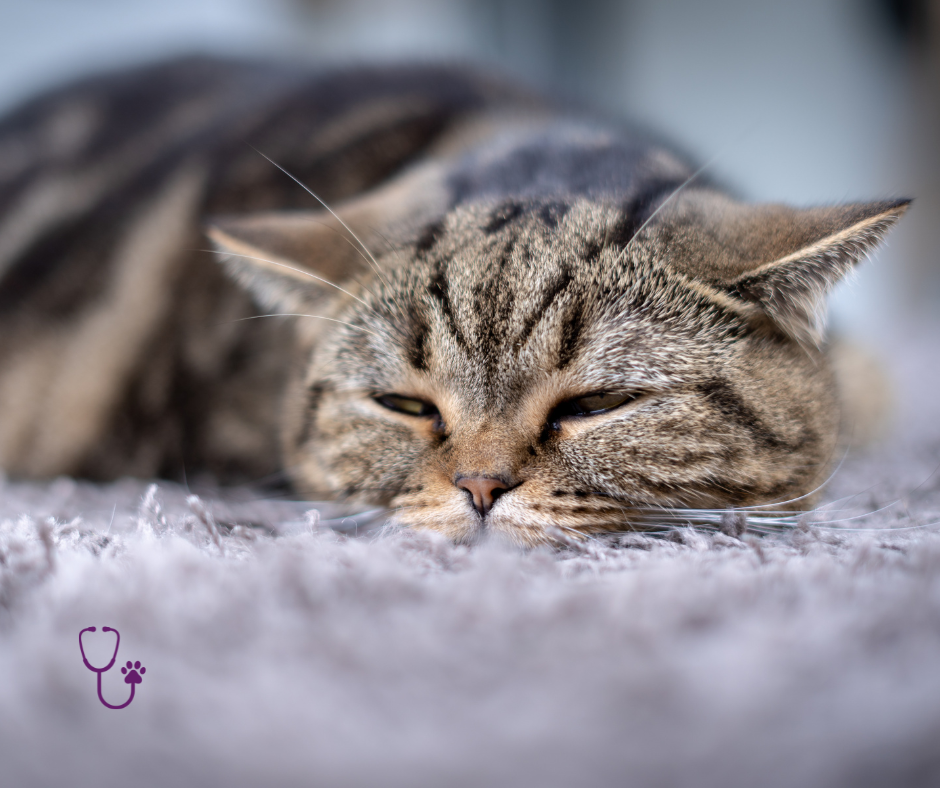A Cat Owner’s Guide to Vomiting, Diarrhea & More
Is your cat vomiting hairballs more often than usual? Experiencing a sudden fit of diarrhea? Gastrointestinal (GI) upset is a common reason cat owners seek our help at Furgent Care in Virginia Beach. While the occasional upset stomach can happen, persistent symptoms can signal a more serious underlying condition.
Cats can be mysterious and mask their illnesses, so when GI symptoms appear, it’s key to understand the potential causes. This comprehensive guide will walk you through everything you need to know about your cat’s digestive health and when to seek veterinary help.
** While we can help with mild to moderate cases, severe symptoms may require emergency or 24-hour specialty care. Call us before arriving to discuss your pet’s symptoms.
Common Causes of GI Issues in Cats
A problem in the gastrointestinal tract – which includes the stomach, small intestine, and large intestine – can manifest in several ways. The cause can be as simple as a minor dietary lapse or as complex as a chronic disease.
Dietary Indiscretion & Diet-Related Causes
Sudden Diet Change: Cats can have sensitive stomachs. A rapid switch from one food to another is a common cause of vomiting and diarrhea.
Eating Bad Items: Scavenging human food, getting into the trash, or chewing on plants can irritate the stomach.
Food Intolerance or Allergy: An allergy to a specific protein (like beef, fish, or dairy) or an ingredient in their food can cause chronic inflammation, vomiting, and diarrhea.
Hairballs (Trichobezoars): While common, frequent hairballs are not normal and can indicate over-grooming due to allergies, skin problems, or stress.
Infectious Causes
Parasites: Intestinal worms (roundworms, tapeworms) and protozoa like Giardia or Tritrichomonas foetus are common culprits, especially in kittens.
Bacterial Infections: Salmonella, E. coli, or Campylobacter can be picked up from contaminated food or water.
Viral Infections: Viruses like Panleukopenia (a severe, often fatal disease preventable by vaccine), Coronavirus, or Rotavirus can cause severe GI distress.
Inflammatory & Chronic Conditions
Inflammatory Bowel Disease (IBD): This is a common condition where the cat’s own immune cells infiltrate the lining of the intestines, causing chronic vomiting, diarrhea, and weight loss. It is a diagnosis of exclusion, meaning other causes must be ruled out first.
Pancreatitis: Inflammation of the pancreas is painful and can cause vomiting, lethargy, and a hunched posture.
Colitis: Inflammation of the large intestine, which typically causes diarrhea with mucus or blood.
More Serious Systemic Diseases
Kidney Disease: Chronic kidney disease is common in older cats. Toxins build up in the bloodstream, leading to nausea, vomiting, weight loss and appetite loss.
Hyperthyroidism: An overactive thyroid gland speeds up the entire metabolism, often leading to vomiting, diarrhea, and extreme hunger paired with weight loss.
Foreign Body Obstruction: Cats, especially kittens, may ingest string, toys, or other objects that can cause a life-threatening intestinal blockage.
Cancer (Lymphoma/Adenocarcinoma): The gastrointestinal tract can be a site for tumors, which cause symptoms like vomiting, diarrhea, and weight loss.
Symptoms to Watch For: When to Be Concerned
Not every episode of vomiting requires a panic-filled trip to the vet. However, certain signs indicate a need for professional medical attention.
Seek Veterinary Care at Furgent Care if your cat shows:
Repeated vomiting or diarrhea within a 24-hour period
Vomiting or diarrhea that contains blood (bright red or looks like coffee grounds)
Lethargy, depression, or hiding
Pain or distress (vocalizing, restlessness, etc.)
Loss of appetite for more than one meal
Straining to vomit without producing anything
Swollen or painful abdomen
Emergency Signs - Go to a 24-hour ER immediately if your cat:
Suspicion of ingesting a toxin (antifreeze, lilies, human medications, etc.)
Suspicion of an intestinal obstruction (string, toy, etc.)
Seizures or collapse
Pale or white gums
Diagnosing the Problem: How Furgent Care Can Help
To find the root cause of your cat’s GI issues, our veterinarians will start with a thorough history and physical exam. We may then recommend diagnostic tests such as:
Fecal Exam: To check for parasites
Bloodwork: A complete blood count (CBC) and chemistry panel to assess organ function, electrolyte levels, and check for signs of infection or inflammation
Urinalysis: To help evaluate kidney health and hydration status
Imaging: X-rays or an ultrasound to look for obstructions, masses, or abnormalities in the GI tract and other organs
Specific Tests: Testing for diseases like hyperthyroidism (T4 test)
Treatment & Management
Treatment is entirely dependent on the diagnosis.
Supportive Care: For mild cases, this may include a bland diet (e.g., prescription GI food or plain boiled chicken), anti-nausea medication, fluids and probiotics
Specific Medications: Dewormers, antibiotics, or immunosuppressive drugs for IBD
Fluid Therapy: Subcutaneous or IV fluids are critical to treat dehydration and restore electrolyte balance
Surgery: In rare cases of obstruction, emergency surgery may be required
Don’t Wait Until It’s an Emergency. We Can Help!
Cats are stoic, and their conditions can worsen quickly. If your feline friend is showing persistent signs of GI distress, the team at Furgent Care is here to help. We can diagnose the issue and provide the urgent care they need to get back to feeling their best.
At Furgent Care, we offer after-hours veterinary care for non-life-threatening emergencies. This includes digestive issues, minor injuries, skin problems, and more.
Located in Virginia Beach | Open Weekdays 2 PM – 10 PM (closed Tuesdays) | Weekends 10 AM – 10 PM
You don't need an appointment—join our check-in online to our waitlist and bring your cat to our veterinary urgent care today. Our team is here to help guide you through your emergency and provide peace of mind.
If you have any specific questions, call us at 757-656-5650 and one of our techs will be happy to help you.

